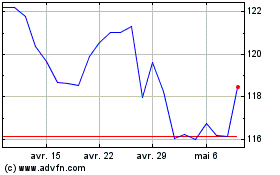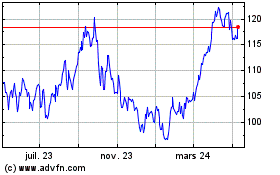By Kejal Vyas | Photographs by Joana Toro for The Wall Street Journal
GEORGETOWN, Guyana -- Along the sea wall separating this sleepy
capital's moldering wooden houses from the coffee-colored Atlantic,
construction workers in hard hats rush to expand ports, build
luxury condos and open the country's first Hard Rock Café.
The developments aim to tap the expected wealth from what until
recently was unimaginable for this jungle-covered former British
colony: oil.
An Exxon Mobil Corp.-led consortium said last week it has begun
offshore drilling after recently discovering at least 3.2 billion
barrels of light crude in Guyanese waters. Guyana is projected
within a decade to pump nearly a barrel of oil per person a day,
more per capita than Saudi Arabia. That makes this poor backwater
of 800,000 people -- mostly descendants of African slaves and
indentured laborers from India -- a top global energy frontier.
"Each Guyanese is going to be a U.S.-dollar millionaire, or
worth that, in a few years," Natural Resources Minister Raphael
Trotman said, referring to a national wealth fund the country is
developing.
Not everyone is convinced of a bonanza.
Many Guyanese say Exxon's deal disproportionately benefits the
company and its minority partners -- Hess Corp. and China's Cnooc
Ltd. -- while leaving little for this country of miners and farmers
on horse-drawn carts. Others worry about corruption and Guyana's
ability to responsibly handle an oil deposit worth nearly 50-times
the nation's gross domestic product.
"Boy, ain't nobody here getting rich when all everyone does is
steal," said Eon Samuels, 25, an unemployed construction worker, as
he fished from a pier.
Exxon has called Guyana one of its most important and
potentially profitable prospects, among a handful of new
developments the company has identified as the best since its
merger almost 20 years ago with Mobil Corp. Western oil companies
have increasingly turned to Latin America at a time when
opportunities have narrowed in other regions such as Russia or Iran
due to sanctions or resource nationalism.
Exxon said that Guyana will receive an estimated $1.6 billion in
royalties and revenue in the first five years after oil pumping
begins in 2020 and a projected $7 billion during the life of one of
its most promising fields. But the company hasn't finished
appraising all the oil that it has found and keeps discovering
more, portending what the company said was a larger payout for
Guyana down the road. "This emerging industry has the potential to
transform the economy of Guyana and positively impact the lives of
people for generations to come," a company spokeswoman said.
It isn't uncommon in the oil industry for the first investors to
get the best deals because they assume more risk. Exxon didn't
discover oil in Guyana until 2015, 16 years after it signed an
exploration contract.
But critics said the government should have demanded better
terms when Exxon renewed the contract in 2016.
"Exxon took advantage of our weak bargaining position and our
inexperience, and they were able to extract everything they
wanted," said Anand Goolsarran, the country's former auditor
general.
The International Monetary Fund, which is advising Guyana,
recently recommended that the government halt granting new licenses
until it can secure better terms and overhaul its tax
structure.
Under its deal, Exxon is permitted to use as much as 75% of
annual oil proceeds to recoup exploration and production costs once
commercial pumping begins. Guyana gets a 2% royalty of the proceeds
plus 50% of the remaining proceeds. That is on par with the world
average for "frontier exploration," said IHS Markit analyst Carlos
Bellorin.
But the oil companies' local taxes are paid from the country's
share of the profits, cutting into Guyana's take.
"We will suffer from that contract for the next 75 years," said
Christopher Ram, a prominent Guyanese attorney who through a weekly
newspaper column and speeches has become a vociferous critic of the
oil deal. "But what do I know? I'm just a third-world bookkeeper,"
he added, sifting through pages of the deal with Exxon.
Guyanese officials acknowledge the terms with Exxon aren't ideal
but they point to other benefits for an isolated, underdeveloped
and thinly populated country that suffers from tensions between its
two main ethnic groups. They say the country needs Exxon's
international lobbying might in a territorial tussle with
neighboring Venezuela, which nationalized Exxon's assets a decade
ago before a court ordered it to pay the company $1 billion.
Guyana's government says that an $18 million signing bonus from
Exxon will pay the country's legal fees, as President David
Granger's government tries to resolve Venezuela's century-old
border claim on two thirds of Guyana's land and maritime territory
-- including areas where Guyana wants to drill -- that has stymied
foreign investment.
We need companies that have international influence in the
corridors of power...so those things come at a price," said Mr.
Trotman, the resources minister. "If we were an ordinary
jurisdiction, I would say our terms look awful. But we have existed
always with a threat of force against us. We have had to make
decisions that are in our best national interest."
Foreign Minister Carl Greenidge, who is courting foreign oil
companies such as France's Total and Spain's Repsol, said the
concerns are overblown. He said the government is preparing to
spend wisely, with lawmakers working on a sovereign-wealth fund to
invest oil earnings in a country with average incomes of about
$4,000 a year.
"I'm tired of people calling this the apocalypse," Mr. Greenidge
said. "There are people here who think oil is just a rumor, a fraud
by Exxon. They're mixing black magic with economics."
Few Guyanese will ever see the oil, which will be extracted 150
miles offshore and loaded onto floating storage vessels before
being sold directly into the market. Onshore, the oil prospects
have spawned a rush of construction activity.
At the Muneshwers Ltd. wharf here, one of Guyana's biggest
container yards, workers rushed recently to expand a port area
where Exxon's supply vessels are loaded for offshore platforms.
Last year, Project manager Rabin Chandarpal had orders to
accommodate one supply ship a week. Now he needs space for four
ships a week.
"The more oil they find out there, the more activity we see
here," Mr. Chandarpal said.
The Pegasus Hotel, one of Georgetown's most prominent, is
planning a $100 million expansion that includes a new 15-floor
convention center. The Trinidadian company MovieTowne is building
an office-space and retail complex that will house eight new
cinemas.
But concerns remain. Some worry that the production of oil will
impact traditional Guyanese agriculture such as rice and sugar.
"I just ask, 'Where are we headed?'" said Somar Gharan, 62, who
works at a sugar mill. He fears Guyana could become like oil-rich
Venezuela.
Another sugar mill worker, Glenroy McKenzie, was sanguine.
"In the next 20 years," he said, "maybe my daughter will be
working on one of those platforms. I have a lot of hope."
Write to Kejal Vyas at kejal.vyas@wsj.com
(END) Dow Jones Newswires
June 21, 2018 12:20 ET (16:20 GMT)
Copyright (c) 2018 Dow Jones & Company, Inc.
Exxon Mobil (NYSE:XOM)
Graphique Historique de l'Action
De Juin 2024 à Juil 2024

Exxon Mobil (NYSE:XOM)
Graphique Historique de l'Action
De Juil 2023 à Juil 2024
